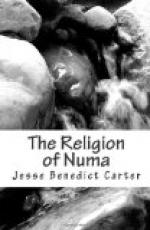While Varro, with the weapon of philosophy, was attempting to defend the religion of the state against its enemies, the poets and the philosophers, a poet, also armed with philosophy, was trying to defend the Roman people against its worst enemy, superstition. It may not seem as though Lucretius belonged among the friends of old Roman religion, and as though the De Rerum Natura were exactly a religious poem, and yet his work was in so far helpful to old Roman religion in that it attacked the excesses of a latter-day superstition which had alienated the hearts of the people from their old beliefs. Superstition is a parasite which lives on scepticism, and with the killing of the parasite scepticism sometimes dies as well; and it is open to question whether Lucretius’s book was not of considerable service in the cause of religion. For religion still lived at Rome, though it is the fashion of the writers on the ethics of the close of the republic to emphasise almost entirely the scepticism of the day, dwelling on the attitude of a Cicero or a Caesar, and forgetting the infinite number of “little people,” especially outside of Rome in the country, who still believed in the old religion of the fathers, and who still performed the old festivals of Numa, people who knew no more about Isis than they did about Stoic philosophy. Their presence is disclosed to us in a few republican inscriptions, but better yet in the continuance of the rites of family worship down into the latest days of Rome, rites which did not form a part of the restoration of Augustus, and which therefore, had they died now, would never have come to life again. It is by just so much more our duty to remember these people, as they have been forgotten by history, if we ever expect to obtain a picture of Roman religion in its true proportions. They were besides the people upon whom Augustus built in the restoration, to which we now turn.




